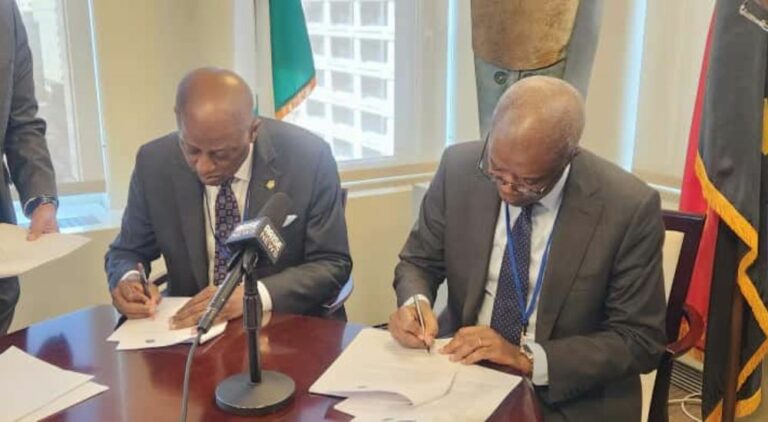
CBN, BANK OF ANGOLA SIGN AGREEMENT TO BOOST CROSS-BORDER FINANCIAL RELATIONS
The Central Bank of Nigeria and the Bank of Angola have formalized a Memorandum of Understanding aimed at enhancing bilateral collaboration, facilitating knowledge exchange, and bolstering capacity development between the two central banks.
The accord, finalized on Thursday during the ongoing International Monetary Fund and World Bank Annual Meetings in Lima, Peru, was endorsed by CBN Governor, Olayemi Cardoso, alongside his Angolan peer, Manuel Antonio Tiago Dias.
Officials have stated that this agreement signifies a new chapter of partnership between the two entities and reflects a broader initiative aimed at ensuring regional financial stability throughout Africa.
During the event, which was overseen by CBN Deputy Governor (Economic Policy), Mohammed Abdullahi, and attended by senior representatives from both institutions, Cardoso characterized the MoU as a “timely and crucial milestone” in fortifying inter-African collaboration in central banking.
“This assembly unites a diverse array of stakeholders and interests worldwide, and what we accomplished today emphasizes the spirit of collaboration that characterizes these annual gatherings.
“The agreement presents us with a chance to cultivate a more interconnected and resilient African financial infrastructure capable of enduring external disruptions,” a statement from the apex bank disclosed on Friday.
The CBN chief elaborated that this collaboration is in alignment with Nigeria’s strategic objective of fostering regional stability, facilitating cross-border financial integration, and strengthening institutional resilience within Africa’s monetary framework.
Expounding further, Abdullahi indicated that the MoU lays down a structured protocol for both central banks to share technical knowledge, regulatory insights, and best practices in supervision.
He identified key areas of collaboration, such as foreign reserve management, currency operations, monetary policy coordination, payment systems, and cybersecurity.
Additional focus areas encompassed by the agreement include anti-money laundering, counter-terrorism financing, staff training, and the enhancement of financial statistics and research capabilities.
“This collaboration will enhance our collective capacity to manage systemic vulnerabilities, improve transparency, and foster financial stability in our respective nations,” Abdullahi remarked.
He further noted that the framework would also bolster oversight of cross-border financial institutions, which is increasingly important as African economies become more integrated through trade and financial services.
In his address, the Governor of the Bank of Angola embraced the partnership, labeling it a “strategic alliance that will enable both nations to deepen financial integration and institutional reform. ”
“Nigeria and Angola possess analogous macroeconomic aspirations, including maintaining stability, promoting financial inclusion, and modernizing our payment systems. This MoU enables us to collaborate toward these shared objectives,” he affirmed.
Dias highlighted that the agreement is also consistent with ongoing initiatives by African central banks to enhance intra-continental cooperation in accordance with the aims of the African Continental Free Trade Area and regional economic integration strategies.
This accord is timely, as African economies are intensifying their coordination on monetary policy, digital payment systems, and anti-money laundering frameworks, amid increasing regional financial flows and vulnerability to global economic fluctuations.
Furthermore, it underscores Nigeria’s renewed diplomatic and economic engagement within Africa under the leadership of President Bola Tinubu, which emphasizes financial sector reforms, regional partnerships, and macroeconomic stability.
The Central Bank of Nigeria, under Cardoso’s direction, has lately undertaken a succession of policy adjustments intended to reestablish trust in Nigeria’s foreign currency market and enhance regulatory oversight.
The most recent collaboration with Angola is thus perceived as a component of a wider initiative to bolster African-driven solutions to the continent’s financial issues, particularly in domains such as liquidity administration, digital finance, and banking regulation.
